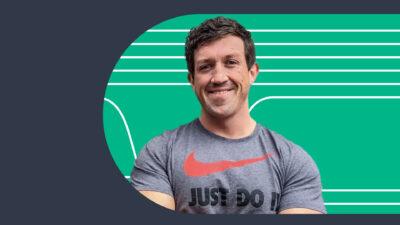This week we talk to David Marquet, a retired United States Navy captain and submarine commander, leadership expert and bestselling author of Turn the Ship Around and Leadership is Language.
In this episode David describes how he transformed USS Santa Fe into what has been called the most empowering organization ever seen, how to transform your leadership style from telling people what to do to letting people make decisions for themselves and why you need to think about the legacy you want to leave as a business owner
Find out more about David and his essential leadership books here.
Episode Link
This episode of The Fitness Founders Podcast can be found on Spotify, Apple Podcasts, and anywhere you get your podcasts.
Transcript
Kevin: How’s it going everyone? Welcome to the Fitness Founders Podcast. I’m Kevin Mannion, VP Marketing here at Glofox. This week we talk to David Marquet, a retired United States Navy submarine commander, leadership expert and bestselling author of the famous Turn the Ship Around. In this episode, David describes how he developed the philosophy for entrepreneurship and business leadership during his time in the military, and how it can be a game changer for business big and small. Let’s have a listen.
David Marquet, welcome to the show.
David: Thanks, Kevin. Thanks for having me on your show.
Kevin: It’s a massive privilege to have you on. I am personally a big fan of yours. I picked up your book probably three months ago. Actually I can’t believe I’m here talking to you, so thank you for coming on. I think you’ve got a really inspiring approach to leadership. I’m really looking forward to talking to you today.
David: Yeah. Thanks.
Kevin: Our listeners are fitness entrepreneurs running fitness studios, running gyms, running yoga studios. There is a lot of people management. There is a lot of administration. Can be very easy to get bog down. We’ve got a lot of people who are maybe first time entrepreneurs really just taking the first steps into leadership. I think a lot of the challenge that they have are really relevant to the things that you talk about.
David: Yeah, super. Thanks for that.
Kevin: Cool. To get started maybe just tell us about before you became say an icon of leadership, tell us your career before that.
David: I was in the United States Navy and I joined way back in 1977. I went to the naval academy and I was taught to sort of say a little bit passively I was taught but a very commanding control type of leadership. You give precise orders, people follow. The job of a leader in this structure is to make decisions and get the team to execute the decision. I like it and I was good at it. I could sort of look, scan around and look at the problems and say, “Okay, no, no. Don’t do it like this. Do it this way. No, no. We’re not going to do that. We’re going to do this.” Because of that, because of my personal ability to make decisions and do things I was successful. The Navy promoted me and they said, “Hey, you’re going to be a submarine commander”, which was my dream job. I was in the submarine force that’s what I want.
It all changed because, even though I spent a year training for one submarine. At the very last minute, two weeks to go, the Navy shifted the plans and they said, “No, no. You’re going to a different submarine.” It was a kind of submarine, one of the newest in the fleet, I never been on before. I was really unsettled. It was really disconcerting. The submarine by the way, the reason I went there was because the previous captain quit. It was the worst performing submarine in the fleet. It was the joke. We’d laugh. They make mistakes that Navy would publish them internally. We’d read how they screwed up. There was also the worst morale. People were leaving. 90% of the sailors who had chance to stay in the Navy left previous year. The captain said, “This is… I’m…” He quit. He resigned. And there is a hole. The Navy said, “No, Marquet, you’re going to go stand the thing.
So imagine, I’m walking on board, the poor morale and the poor performance, I had dealt with that before. I’d smart my way out of that. I would take charge and incrementally beat people up until they did it the right way. I could see how a lot of things were kind of going wrong and stuff. But I didn’t know the specifics of the ship until my ability to issue these orders was impair. I wanted to but I couldn’t. It hit me very early on. I gave and order that couldn’t be done on the ship. It was the equivalent of ordering shifting 2nd gear on a car with just one gear. Here’s the scary thing, the officer ordered it. I suggested it. He ordered it. We want to think, “Oh, but people will speak up if it’s not right and people will tell you no, no, it can’t be done.” That’s not true. That’s wishful thinking. Most of the time they are going to go along.
I realized that my whole view of leadership which was I make decisions and other people execute them was very limiting. I call it leader-follower. It is so pervasive. We didn’t question. Of course that’s what it is, and I started questioning everything. I said, why can’t everyone be thinking? Why can’t everyone act like a leader? Why can’t everyone think of themselves as a leader? Why do I have to be the source of all this? Besides it was just exhausting and stressful because I ran around, and tell who work and check on them. It was horrible. I hate it. I said, the problem isn’t me making a bad decision. The problem is I’m making decisions. I’m going to get out of the decision making business. You guys make decisions and tell me. All we did was change our language. Your business owners have a lot more control, way more control than I did. They hire people. They move them from position to position. They can change their schedule. They can buy software. Sent people to training. All of that was fixed for me – my schedule, the people I got. You don’t choose the people. The Navy sends people. But that’s really, those constraints really focused you on the language. And the language, it was good for me because I wasn’t distracted by these other things.
The goal is to take the people you have with everything that you have. I wouldn’t worry about any other stuff, and just make it the best interactions possible for the people that you have. So what I’m talking about is every time someone would come to me and say, “Hey, here is the situation. What should we do?” I just would not answer the question. I always say the same progression. What do you see? What do you think? What would you do? It’s a very important progression because you’re moving from what feels certain. What I see seems very certain. Well, here is the situation, this customer is angry because blah… blah… blah. Okay, what do you think? Think is like an analysis, an assessment. “Well, they just joined a month ago and we should give him a second shot” or “It’s not really worth it. They’ve been in a long time. They’ve been with us for 10 years. We got to take care of this.” Whatever happen. So I’m putting some brainpower into it. Well, what would you do? What would you do if you are me? And our magic word was intend. What do you intend to do? What do you intend to do about this. And over and over and over again, “If you are me what would you do?” If you have to make this decision yourself, how would you make it? How would you think through it? Over and over and over again I just wouldn’t answer the question. The crew became, at first some people are kind of frustrated by it, but then basically they love it. Because they just come to me all day long and say, “Hey, here is the situation, here’s what I see. Here is what I think. Here is what I intend to do about it.”
They don’t need to get permission. Permission is a great way to prevent people from doing things. It is designed to prevent people from doing things. You need permission. Don’t do. Heaven forbid you do any. You got to run that by me first. The idea is people would say, I like running by. I like the, “Hey, let’s state what we are going to do.” But I don’t want the action to be linked to a response. In other words, you would say something like, I’m making this up, “Hey, we are unhappy because [unclear]” Whatever. So you could write a policy for that or you could tell them, “Okay, refund them the money.” Or you could say, “Well, what would you do? What do you think is the right thing to do?” “We should refund the money.” But then better yet they say, “Here’s what I intend to do. I’m going them their money back.” The reason I love it is because the ownership, the bias for action, the motive force rest with them. You are no longer running around to make things happen. At the same time you can trap is and say, “No…”, or ask questions.
Kevin: Obviously you came upon this approach due to a set of scenarios that almost had you come upon the approach you are limited in some of technical knowledge that you have. When you talk to other leaders that have all the knowledge, they know how they want to run the business, they know every single things that needs to happen in the gym and in the studio. How do you tell them change their mentality to resist the urge to provide those solutions? How can someone do that themselves?
David: We play a game called ‘fast forward’. Humans have the superpower of time travel. You can imagine yourself in the future. Now, we don’t take full advantage of it. I say imagine yourself… Six months is usually what we use but sometimes you can just say one hour. Imagine it is one hour from now, what do you wish you did right now? Now I say, position yourself mentally in the future and you look back to today. Position yourself six months from now, September 25th 2021, what do you wish you would have done today? You realize if I just keep making decisions then in 2021 I’m going to keep making decisions, in 2031 I’m going to keep running around making decisions. And then finally, I’m going to go turnover my company and no one can do anything because I’m the only person doing the thinking. They are doing the doing. Or I try to sell the company and it is worthless because there is no company. It is just me.
Activating a longer term perspective using ‘fast forward’ sometimes helps people realize what I need as a team that can make decisions without me. I just ask people, “Hey, what is your day, what is your week like? How many hours a week are you working?” “Oh, 144.” “And you’re proud of that?” “Yes.” “Don’t you ever want to go on vacation? Don’t you ever want to take a time off? Daughter’s wedding? Don’t you ever want to retire?” “Well, I guess so. I’m exhausted all the time.” Okay, well it’s because of you. You’re the problem. People time to step back. Leasing don’t necessarily need to take a lot of time.
Kevin: Yeah, that’s very good point. Now, one of the things that you talked about which I found fascinating is that you should try to eliminate top down monitoring systems. Every business whether it is a software business or fitness business are full of top down monitoring systems. Why is that a bad thing?
David: We had a ritual of getting together once a week and then the boss, so it’s either me or my right hand man, basically going through a list of what everyone was supposed to do and quizzing them on the stats. We felt we were doing our job because were holding people accountable. The problem with that is the person who is really responsible is me. If I’m saying, “Well, how it is going with this, that, and the other thing?” I’m the person who has the sense of ownership and responsibility. Let’s say I’m running a fitness studio and I put someone in charge of new customer onboarding. I’m like, “Okay, show me the forms. How does it work?” Then I’m making it happen. What you want, you want to see the forms. You want to understand the process but you want them coming to you and say, “Hey, here is my Phase 0 process. Here’s what I will start with. We will run this for a month and see how it goes. And then modification. I’ll tell you what I learn but this is what I’m going to start with.” When you think of it they are inviting feedback. Don’t give feedback if people haven’t asked for it. Have a culture of where people ask, “Hey, how does it look? What do you think? How to make it better?” That’s what you want. And people say I always thought, well, no one is doing that so I have to keep telling them what to do. I have to be the one thinking. The problem is the reason they are not doing that is because you keep telling them what to do. You have to stop telling them what to do first and say, then you’ll see what they think about. Not everyone is going to want it, and that’s okay. But I think you’ll find the majority of people are much more happier.
We know that… There are studies that show that when people feel the sense of control over their jobs they are healthy. It live longer bottom line. We think we’re doing the right thing. Look when you start as an entrepreneur you’re doing everything. You’re washing the floor. You unlock the studio in the morning and lock it up at night. You’re doing advertising campaigns, then in the middle you’re teaching a class on pilates. You’re doing everything. And then, hey, you’re successful, and now you hire a person, and you still sort of trying to do all those things. You’re probably better than that person at every one of those things but it doesn’t mean you should do them all. You need to realize when you’re running a business, let’s just imagine you are actually better, and you know it 10x. You got 10 people. You could do all 10 things but you’ll never… That’s their business. But if each of the person I think they will quickly be able to figure out how to do it better than you because now all they are worrying about is their one thing. They could figure it out. Yeah, it is just exhausting. That’s the thing too for me. I just didn’t have the energy. I was lazy.
Kevin: Fair enough. Tell me about a time when either you or someone you’ve mentored changed things, took the hands off and did it in a way that either didn’t work overall or didn’t work for key people on their team. That they just didn’t have someone to tell them what to do and the business fell apart.
David: Oh my gosh. Well, I don’t think we’ve ever had a business fell apart. We have a lot more good stories than bad stories. Fair enough question. One thing that happens when we go in and business owners says he/she is going to start operating this way is we do typically see an upturn internally. The temporarily upturn internally. Some people will not want this. They’ll be uncomfortable. If you can find a place for them as I quote do and told worker. Fine. But they may opt that which is okay. Personally I think it is okay. You want people to be successful which means creating the best environment for them to be successful which may be a different environment than the one you’re creating.
We do see a pump up turnover but then it typically goes down and settles up lower. Sometimes well lower. We have a big company. They estimated last year. They saved $120 million on hiring and training because their turnover… They are in a business which at typical 30% turnover. Lots of turnover. It’s a big company – 100,000 people. You can imagine what if 30% down to 20%. That’s a lot of people. You are talking 10,000 people that you don’t need to find, train, hire, on and on and on. So that’s okay.
Kevin: Tell me about maybe a time when you met an entrepreneur who considered themselves [unclear] Some of the practical things that they maybe did to make this work?
David: Well, first if they consider themselves I like the self-awareness of that. All entrepreneurs are control freaks. Humans are control freaks in general. We like control. We like making decisions. We like that kind of thing. We like the certainty that comes with that. Entrepreneurs are generally, in my experience in extreme case, are control freaks. The more self-aware ones will say it’s just really uncomfortable for me. I know I can do it faster and better myself. Yeah, right now today. What about six months from now? What about 10 years from now?
And so, Ireland, you got dealing with COVID but eventually it will go away. What I have them do is go to dinner 10x not order. Every time you go out to a restaurant you don’t get to order. Well, I do that now. Well, tell me. Well, I say, “What do you recommend chicken or fish?” The server says, “Chicken.” I say, “Great! I’ll have a chicken.” [unclear] You still chose chicken. Didn’t you hear it? I want you to say, “Mr. server or madam server, you choose for me.” And when you put it in front of me then I will know what you brought me or maybe not and I have to ask you to tell me about it. But that’s what I want.
Now, the reason this is such a powerful activity is a couple of things. Number one, you won’t know what you get and you’ll feel uncomfortable and you might not be able to do it. And you’ll find, oh it’s different. I’m travelling to Korea. I’m not sure I want to try it. Or I’m tired or I have a bad day and your reaction will be different. I want you to notice those things. And then number two, is how the server responds. Some servers are enthusiastic. Some are like, “Nyah.” How can you get them to make these decision for you? Short answer is you need to make it safe for them to make these decision. How you do that? Depends on the person. And so you are practicing, and then you’ll learn how you make it safe for you, how you make it safe for them. You’ll find different strategies. How you connect with them as a human being? How you get them to make these decisions? Those are the exact same strategies that you are going to need and work. And those are the exact same feelings or experience that work. This is the closest I can give people to what it was like for me. How it felt for me as a submarine captain leaning back and letting the crew come to me with decisions. Sometimes people send us stories like what happens. It’s really good.
Now there is COVID. People have picked different things. Some people let their partner pick the next book for them to read or they stop. Maybe their thing is like the dishwasher has to be loaded a certain exact way and there can’t be any inefficient space to use or something. Give it up. Let someone else do it. Okay, it’s all the same thing. Or maybe it’s like what are we going to do this weekend. What are we going to watch on Netflix or whatever it is? Give it up. You pick something that matters to you and give up the decision to somebody else and see how that feels. It works. Talking about it doesn’t work. Reading about it doesn’t work. Thinking about it doesn’t work. Practicing it works.
This is again for my rant on the leadership development industry it is like we are teaching it like history. In this year, Brian did blah… blah… blah. It’s like can you regurgitate what year Brian did this thing. I don’t even know. But that’s not how leadership works. Leadership is more like football. It is like kick the ball. You got to learn to how to play football. Anyway, you got to get out there and practice. You got to try everything. Kick the ball, where did it go, left. Kick the ball, where did it go, high. Kick the ball, where did it go?
Kevin: Got it. The last question I have for the powerful insights today is you talk a lot about legacy and inspiring the people, the body, by communicating what legacy you’re building in your business. Maybe give us a couple of pointers and what that actually means and how it can be done really well.
David: It starts with you. What matters to you? And maybe your question is what matters to you now? But what do you think is going to matter to you in the last 6 months of your life? There’s a couple of interesting books. There is a book by an Australian nurse, Bronnie Ware is her name, Top Five Regrets of the Dying. And there is another book that came out I think recently. When people realize that, and we all know we have a limited time, it’s like 10, 20, 50 years is long. Let’s say, now you have two weeks to live, and then we conversations with those people and we ask them about their lives and about regret. What do they wish they have done? Very commonly the number one thing is basically I wish I’d had the courage to live the life I truly wanted to live. That often means we’re living a life that we think we are supposed to live, or that society wants us to live. I graduated engineering so I need to be an engineer. You know, I just really want to be an artist. I measure success with the size Mercedes I have in my front yard.
When you think about what is important it ends up being other people. At the end of the day you’re gone, your Mercedes is going to be rust and it’s not going to matter. It’s meaningless. But if you can make the lives of other people better, it’s an extending circle, they can make the lives of people better. For fitness owners, so many people have sedentary lives now. I think it is amazing opportunity because people are more active then they can be better parents because they can play with their kids. And then their kids are not bullies because their parents pay attention to them and just not ignore. And you can live long. I mean it goes on. And that we can move. We’re 80 years old but we are still moving around and playing tennis and whatever. To me, as a fitness owner, I measured my impact on first I have to take care of the people in my employ. They need to be number one focus. Then they along with me help take care of our customers and then they can then be better family members and have fewer sick days whatever happens to be. That’s how I measure my impact and success.
And I think at the end of your life… But you have to decide. But think about it. Okay. I just got an email from God it says I have two weeks to live. What is going to matter to you and how you’re going to spend that time, and then live more like that.
Kevin: I think that’s it. I think that’s a great reminder for everyone. I think a lot of our listeners are around that road but I think that really clarifies. It’s a good reminder of the work that they do. Okay, before David I let you go, just tell me what is the biggest lesson that you learned in the past 12 months?
David: I like to travel. I’m definitely on the introverted side. If you see I have pictures of me, I was like this geeky awkward high school kid. Maybe I still am. Anyway, when I was travelling all around I was doing it maybe a little too much but there is this sort of work element to it. I needed to because I needed to talk to the client so we could make business so I can pay my people who would do things that they were doing. Fortunately we are pretty well. I do pretty well on Zoom. But I like it. I like showing up at the conference and meeting people and hearing their stories. I always do a plus one. I wasn’t super rigorous about it but I call it. So if I’m going to go to Dublin, I mean there is so many great things to do. For example, one time, I went visited the Guinness factory. I know that’s not that creative. But one time I went running down south, and just like do the conference or meet with a client or whatever I’m there for. But then do something. I just enjoy that part of it. I think it is because a part of it is I spend time in nature. I spend a lot of time under the water. I spent 7 years in my life actually underwater.
Kevin: Wow! Okay. Well, listen it’s been really great to talk to you today. And it’s only a sample I think of some of the wisdom. I definitely would recommend your book Turn the Ship Around if people haven’t used it for any walk of life. But before, last thing, just tell people where they can maybe find, discover you online if they haven’t already, and how they could get in touch?
David: Well, Turn the Ship Around, you can get it in my tiny bookstore. Online our program is called Intent Based Leadership Institute or Intent Based Leadership International. We just changed the name. We have a presence on LinkedIn. But I think a really good place to go is on our YouTube channel which I call Leadership Nudges. There’s little things like next time you go to a restaurant see if you can get the server to choose for you. That’s one of our leadership nudges. But there is just little things like that that you can practice to help you be a good leader. The channel is called Leadership Nudges on YouTube and you can subscribe, and they are all free.
Kevin: Cool. We’ll put a link in the notes so people can check that out. Okay. Well, David Marquet, thank you very much for coming on the show.
David: Alright. Thank you, Kevin. Thanks to all listeners… when this thing leaves.
Kevin: Cool. Nice one.
David: But Ireland is one of the places I’m travelling.
Kevin: Like you.
This podcast is brought to you by Glofox, a boutique fitness management software company. If you want to accelerate growth, work efficiently, and deliver a well-branded boutique customer experience then find us at glofox.com.








